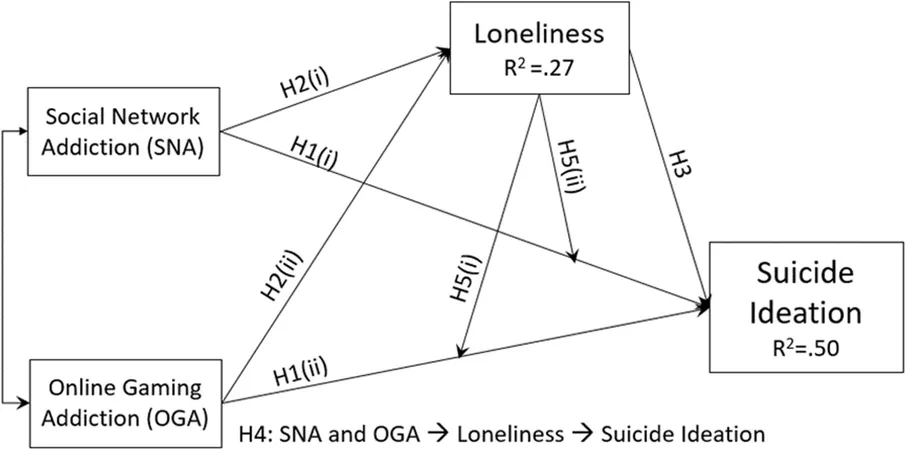
Digital Addictions, Loneliness, and a Hidden Epidemic: The Shocking Link to Suicidal Thoughts
2025-08-30
Author: Wei
Understanding the Crisis of Suicidal Ideation
Suicide is a profound global health crisis, often seen as a tragic escape from unbearable emotional pain. With the World Health Organization reporting around 800,000 suicide deaths annually, translating to one life lost every 40 seconds, it's clear that this issue cannot be ignored. A significant number of individuals grapple with suicidal thoughts, particularly in lower-income regions, where access to mental health services is limited.
The Role of Loneliness in Mental Health
Emerging studies highlight loneliness as a critical psychological factor connecting digital addictions like social media and online gaming to suicidal thoughts. Loneliness, defined as the painful distress of social disconnection, can lead to increased emotional vulnerability. In our hyper-connected world, excessive engagement in digital platforms may ironically escalate feelings of isolation, stripping away real-life interactions and fostering deeper emotional struggles.
Cultural Context Matters
Particularly in collectivist societies, such as Turkish culture, the pressure to maintain social bonds can intensify feelings of loneliness when these relationships falter. Dependence on digital interactions can erode traditional support systems, exacerbating the pain of loneliness and dramatically affecting mental health.
The Digital Double-Edged Sword
Digital platforms can offer both connection and isolation. Engaging in social networks or online gaming can lead to unhealthy comparisons and a distorted sense of self-worth. While these platforms are intended to foster friendships, they often leave users feeling more disconnected and vulnerable to feelings of inadequacy, ultimately paving the way for suicidal thoughts.
Investigating the Links: Study Insights
A recent study involving 1,186 participants examined how social network and online gaming addictions correlate with loneliness and suicidal ideation. The findings were striking: those who fell into patterns of digital overuse exhibited increased feelings of isolation, which in turn heightened their risk of suicidal thoughts.
Combating Loneliness as a Strategy for Prevention
The results show that addressing loneliness directly could be key in tackling suicidal ideation linked to digital addictions. Effective mental health strategies should not only minimize screen time but also encourage real-life social interactions. Programs that promote offline engagement, improve social skills, and foster healthier technology habits are essential.
The Urgent Need for Change
This research underscores the necessity of understanding loneliness not just as a consequence but as an active factor influencing suicidal thoughts. By implementing culturally sensitive interventions, we can help mitigate the impact of digital addiction and loneliness—a crucial step in fighting the rising tide of mental health crises in our society.
Moving Forward: Recommendations for Future Research
Future inquiries should expand on these findings with longitudinal studies to establish causality and explore the intricate web of relationships between digital addictions, loneliness, and mental health. By addressing both psychological factors and cultural contexts, we can develop more effective interventions to combat this silent epidemic.
Final Thoughts
As technology continues to intertwine with every aspect of life, understanding its effects on mental health becomes increasingly vital. We must prioritize mental health awareness and create supportive frameworks to protect vulnerable populations from the devastating consequences of loneliness and digital addiction.

 Brasil (PT)
Brasil (PT)
 Canada (EN)
Canada (EN)
 Chile (ES)
Chile (ES)
 Česko (CS)
Česko (CS)
 대한민국 (KO)
대한민국 (KO)
 España (ES)
España (ES)
 France (FR)
France (FR)
 Hong Kong (EN)
Hong Kong (EN)
 Italia (IT)
Italia (IT)
 日本 (JA)
日本 (JA)
 Magyarország (HU)
Magyarország (HU)
 Norge (NO)
Norge (NO)
 Polska (PL)
Polska (PL)
 Schweiz (DE)
Schweiz (DE)
 Singapore (EN)
Singapore (EN)
 Sverige (SV)
Sverige (SV)
 Suomi (FI)
Suomi (FI)
 Türkiye (TR)
Türkiye (TR)
 الإمارات العربية المتحدة (AR)
الإمارات العربية المتحدة (AR)